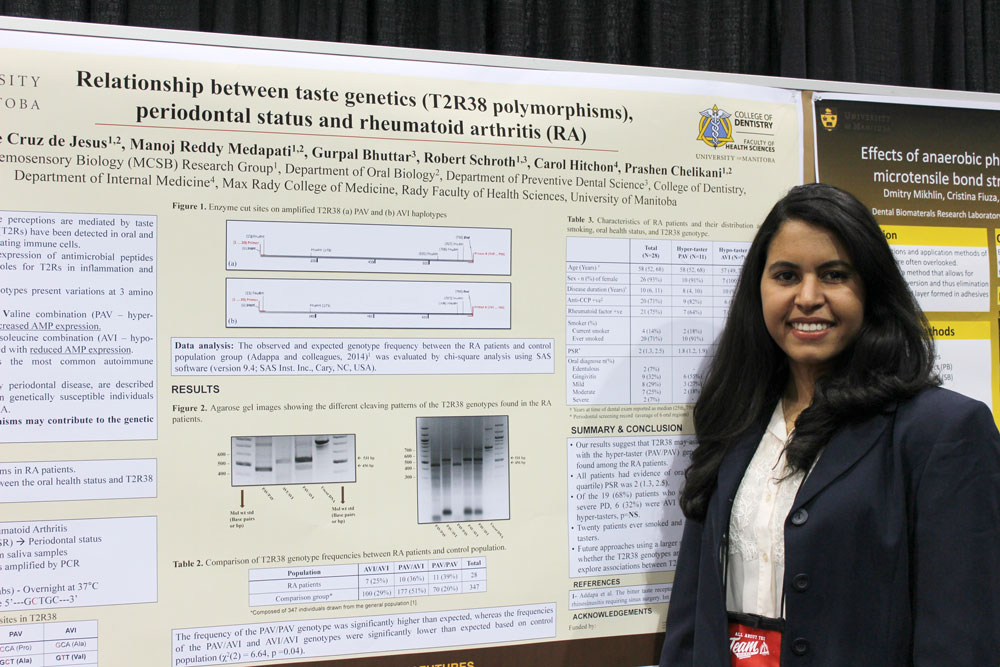
CRUZ BELIEVES HER STUDY IS THE FIRST TO SUGGEST A LINK BETWEEN GENETIC DISLIKE OF BITTER FLAVOURS AND RISK OF RHEUMATOID ARTHRITIS.
Study suggests being a ‘super-taster’ of bitter flavours may put you at disease risk
Do you find vegetables like brussels sprouts, kale, cabbage and broccoli disgustingly bitter?
How about grapefruit juice or black coffee?
If such flavours strike you as horribly intense, you may be a “hyper-taster,” also known as a “super-taster.”
It’s in your genes, says Vivianne Cruz, a U of M master’s student in oral biology whose research poster won an award at the College of Dentistry’s recent 2018 Research Day.
People with the genotype PAV/PAV, Cruz explains, are highly sensitive to certain bitter-tasting compounds in food. Those with the genotype PAV/AVI – roughly half the population, including Cruz herself – are “medium tasters” of bitterness.
And those with the genotype AVI/AVI are “hypo-tasters” or “non-tasters” who can’t detect the bitter compounds at all.
A quick way to identify your genotype is by placing a paper test strip coated with a bitter chemical onto your tongue. (Testing kits can be ordered online.) Cruz says the results are dramatic. “Super-tasters make a scary face,” she says. “One friend of mine almost threw up. Non-tasters say things like, ‘What am I supposed to be tasting?’”
These genetic differences have been known to scientists for decades. But less than 10 years ago, researchers discovered that bitter taste receptors aren’t only found on the tongue. They’re in other parts of the body, such as the digestive and respiratory systems. Understanding the receptors’ functions outside the oral cavity has become an exciting field of research, Cruz says.
Scientists are starting to find associations between taste receptors and disease. It’s been shown, for example, that non-tasters are at greater risk for chronic sinus infections and tooth decay.
Cruz believes her study, funded by the Canadian Arthritis Network and the Natural Sciences and Engineering Research Council of Canada, is the first in the world to search for a link between “taste genetics” and rheumatoid arthritis.
“Studies are finding that bitter taste receptors are related to the immune system, and rheumatoid arthritis is an autoimmune disease,” she notes.
Cruz, who graduated as a dentist three years ago in her home country of Brazil, came to the U of M last year to conduct research with the interdisciplinary Manitoba Chemosensory Biology Research Group, led by oral biology professor Dr. Prashen Chelikani.
With Chelikani as her advisor, Cruz collaborated with a Rady Faculty of Health Sciences team including Dr. Carol Hitchon, rheumatologist and associate professor of internal medicine, and Dr. Robert Schroth, clinician scientist and associate professor of preventive dental science.
The team analyzed DNA from the saliva of 28 patients with rheumatoid arthritis, comparing their genotypes with those in a control group of 347 healthy individuals. The findings were more significant than expected.
“We found a higher frequency of super-tasters in the rheumatoid arthritis population than in the normal population, and a lower frequency of medium tasters and non-tasters,” Cruz says.
“Research has shown that super-tasters present a stronger immune response against bacteria than the other two genotypes. That response results in increased secretion of antimicrobial compounds – an inflammatory process. We think this may contribute to the development of rheumatoid arthritis, a disease of chronic inflammation.”
Cruz says the field of studying taste receptors holds great promise, particularly since there are 25 bitter taste receptors in humans, and her study focused on just one.
“For my PhD research,” she says, “we want to use a larger sample size and further explore the apparent association between taste genetics, inflammation, immunity and the risk of rheumatoid arthritis.”
Read about the other winners and view a slide show from College of Dentistry Research Day.






